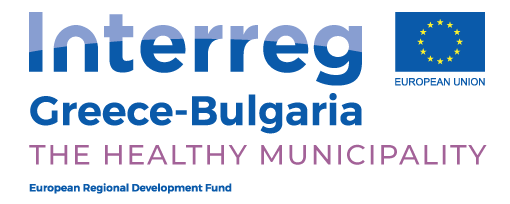Policies for Enhancing Access to Health Services in Deprived Areas - The Healthy Municipality
Current provisioning of health services in the remote cross-border areas primarily focuses on coping with emergency cases and not on their prevention. Latter means low level of health services and degradation of the quality of life of the local population, high costs of health services both for the local people and for the providers of health services. Taking consideration of these problems the overall objective of the project “The Healthy Municipality” is the designing and introducing of prevention policies at Municipality level in the remote cross-border areas.
As such the project pursues to support appropriate prevention policies upon:
- investigating morbidity causes, developing population morbidity maps and formulating policies for its reduction,
- investigating the access to health services along with the degree of needs’ coverage for the specific services in the project partner areas,
- locating vulnerable groups and taking measures for improving their support for prevention (diagnostic exams, standard protocols for treatment of incidents),
- developing tools (patient cards, digital alert systems, equipment for health centers, networking local health structures),
- designing local health policy plans and organizing communication actions for applying a common plan in the project areas and
- implementing pilot applications (diagnostic and clinical exams for vulnerable groups, health prevention sessions).

A series of activities contribute to mainstreaming the project results in the CB area.
The project’s objective contributes to the program priority Specific Objective 8 «To improve access to primary and emergency health care (at isolated and deprived communities) in the cross border area” by implementing prevention actions addressing the local population, by the introduction of prevention policies and capacity building at Municipality level in the remote areas (developing tools - pilot applications to support their prevention policy), by setting up a cross-border lab on Municipal health prevention.
The project objectives are being reached in a cross-border approach, primarily because of the common geographic and socioeconomic characteristics of the remote cross-border areas, secondly, because of the lack of health coverage in those areas, the difficult access of the local people to medical help, meaning that the early diagnosis of the diseases is particularly low whereas prevention is missing.
The project, while designing and introducing prevention policies at Municipality level in the cross-border remote areas, focuses on actions promoting primary care services and actions of cross-border added value such as a digital data base with patient cards in each area, a digital alert system, a digital Municipal health platform in each partner area, digital networking of local health structures, all designed under a common methodology.
The Partners of the project, the population of the area, the public health sector, the local communities, as well as other local Municipalities, from the whole Interreg Greece - Bulgaria Program area will benefit from the project implementation.
Project Budget
The Total Budget of the Project: 1.135.147,40€
ERDF Contribution: 964.875,29 €
National Contribution: 170.272,11 €
Project Duration
The Project Duration: 1/11/2017 – 31/10/2020
Overall Project Coordinator
Mr. Efstathios Kefalidis

Project Work Packages & Deliverables
| WP 1 | Project Management & Coordination |
| Deliverable 1.1 | Preparation Activities |
| Deliverable 1.2 | Management structures at each partner |
| Deliverable 1.3 | Internet portal for project management |
| Deliverable 1.4 | 6 transnational meetings |
| Deliverable 1.5 | External evaluation |
| WP 2 | Communication & Dissemination |
| Deliverable 2.1 | Communication policy |
| Deliverable 2.2 | Project web site |
| Deliverable 2.3 | Publicity material |
| Deliverable 2.4 | Kick off and closing conferences |
| Deliverable 2.5 | Local information seminars in partner areas |
| WP 3 | Stocktaking |
| Deliverable 3.1 | Population socioeconomic characteristics and operating health infra structure (desk analysis in each area) |
| Deliverable 3.2 | Research (questionnaire): Access to and degree of needs’ coverage of health services in partners' areas |
| Deliverable 3.3 | Sampling on identifying local morbidity in project areas |
| Deliverable 3.4 | Synthesis Reports for each partner area and for the entire cross border area |
| Deliverable 3.5 | Designing digital maps on morbidity and health infra structure |
| WP 4 | Developing Tools - Early Warning System |
| Deliverable 4.1 | Setting up examination protocols in partner areas upon most frequent diseases |
| Deliverable 4.2 | Digital data base in each area with patient cards and digital alert system |
| Deliverable 4.3 | Digital municipal health platform in each area |
| Deliverable 4.4 | Supply of additional equipment for health centers |
| Deliverable 4.5 | Networking local health structures |
| WP 5 | Designing Local Prevention Policy and Pilot Testing |
| Deliverable 5.1 | Designing local health policy plans |
| Deliverable 5.2 | Setting up common cross border prevention plan for pilot testing |
| Deliverable 5.3 | Designing and applying communication actions for applying commn plan in project areas |
| Deliverable 5.4 | Pilot application in each area |
| WP 6 | Evaluation and Mainstreaming |
| Deliverable 6.1 | Evaluating results of pilot application at local level |
| Deliverable 6.2 | Synthesis report and results on application of pilot application in entire cross border area (problems and good practices) |
| Deliverable 6.3 | Adapting local plans to results of pilot application |
| Deliverable 6.4 | Setting up cross border lab on prevention and primary health policies |



